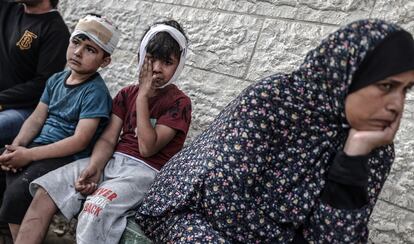Virginia Gamba, UN representative: ‘The parties to the conflict in Gaza are doing irreparable harm to children’
The United Nations confirms that the Israeli army has killed and maimed thousands of Palestinian minors in Gaza, which is why it has included the country on its blacklist

The Israel Defense Forces (IDF) — the army that Israeli Prime Minister Benjamin Netanyahu claims is “the most moral in the world” — is part of the United Nations so-called blacklist for the first time. This document lists the entities — state or non-state — that have committed serious violations against children, and also includes Hamas and Islamic Jihad. The coordinator of this document — which analyzes the situation of children in 20 countries, and was presented in a June 13 annual report — is Virginia Gamba, the U.N. Special Representative for Children and Armed Conflicts. According to Gamba, Israel’s inclusion in the list “is one of the strongest wake-up calls because the parties to the conflict [in Gaza] are doing irreparable harm to children.”
“The situation in Gaza is dire. If 40% of the population is under 15 years old, obviously children are the most impacted by the war,” says Gamba, 70, in a video conference from her office in New York. Among the serious violations against children recognized by the U.N., murder, maiming and kidnapping stand out, as well as sexual violence, forced recruitment and attacks on schools. Over the past year, especially since the start of the Israeli offensive on Gaza after the Hamas attack on October 7, her office has documented that the Israeli army has killed and maimed children, and also attacked schools and hospitals, where children were located. The attacks on these facilities, the representative clarifies, do not result in being included on the blacklist, “although it is a serious violation.”
The United Nations has verified the deaths of nearly 2,300 Palestinian children, mostly in Gaza but also in the West Bank and East Jerusalem, over the past year. “Most incidents were caused by the use of explosive weapons in populated areas by Israeli armed and security forces,” the document maintains. Other agencies such as UNICEF put the figure even higher, arguing 14,000 children have been killed just in Gaza since the start of the war in October. The maiming of Palestinian children — another reason for which U.N. Secretary General António Guterres included the IDF on the blacklist — is estimated at almost 2,000, although more than 10,700 complaints are still to be verified.
Gamba says that she has been in contact with the Netanyahu government for almost two years. Before the offensive in Gaza, both sides had negotiated a plan to prevent violations against children. “Already since then, we had noticed a pattern [of violence] that was emerging.” The last time she was in contact was at the end of May, when the Israeli executive offered to collaborate to develop a roadmap, according to the report. However, after Guterres announced that Israel would be included on this list, “the talks are frozen,” Gamboa laments. “We hope that Israel will take the bull by the horns and sign an action plan to protect children. We don’t know how they are going to act yet.”

The United Nation’s announcement was met with anger by the Netanyahu government. “Today, the U.N. added itself to the blacklist of history when it joined those who support the Hamas murderers,” the Israeli prime minister posted on X (formerly Twitter). However, the report also documents violations against Israeli children, mostly attributed to the armed wing of Hamas and Islamic Jihad, for killing, maiming and abducting Israeli children. How does Gamba respond to these types of statements from Israel? “Let it never be forgotten that we put Russia on this list because of the violations in Ukraine, and there was a worse reaction. But we are still alive,” she says. The final decision rests with the secretary general, Gamba specifies. “It has a very important political weight to be included on this list, so [Guterres] is the one who takes this responsibility.”
Paradoxically, the only option Israel has to remove its army from this list — which includes other state actors from Myanmar, Somalia and Yemen, as well as armed groups such as ISIS, Colombia’s ELN and Hamas — is by cooperating with Gamba’s office. “The only way to change the call for action is to collaborate with the United Nations to implement measures that reduce and subsequently end violations against children. However, it is very difficult to convince the parties in conflict to establish a joint action plan,” she says.
What are the consequences of being included in the list? Gamba does not rule out the possibility of Israeli officials being sanctioned (since states are not punished), although she does warn that very specific conditions must be met, and this situation does not meet them. “We do not decide if someone is sanctioned, but rather there has to be a specific committee that does so, in addition to what we already found in the report.” “It has only happened on two occasions,” says Gamba, “when 14 individuals from the Democratic Republic of the Congo were sanctioned, as well as two others from the Ivory Coast.” Each country, however, can decide on how to interpret this list and restrict the sale of weapons to these countries or, if necessary, issue sanctions, as the United States and the EU have done against violent Israeli settlers.
The U.N. representative, who refuses to classify Israel’s actions as “war crimes” until an international court does so, denounces the difficulties in verifying violations against children in Gaza. “We know these violations are occurring from medical records or through interviews with Palestinian refugees. It is a hot war situation, so our personnel are very vulnerable,” she says. Despite these obstacles, Gamba remains optimistic that the deaths of so many Palestinian children will not only be verified, but that the culprits will also be identified.
“To give us an idea, we are still verifying violations that ISIS committed against children in Iraq five years ago. I know that everything that happens in Gaza will eventually be known,” she says.
Sign up for our weekly newsletter to get more English-language news coverage from EL PAÍS USA Edition
Tu suscripción se está usando en otro dispositivo
¿Quieres añadir otro usuario a tu suscripción?
Si continúas leyendo en este dispositivo, no se podrá leer en el otro.
FlechaTu suscripción se está usando en otro dispositivo y solo puedes acceder a EL PAÍS desde un dispositivo a la vez.
Si quieres compartir tu cuenta, cambia tu suscripción a la modalidad Premium, así podrás añadir otro usuario. Cada uno accederá con su propia cuenta de email, lo que os permitirá personalizar vuestra experiencia en EL PAÍS.
¿Tienes una suscripción de empresa? Accede aquí para contratar más cuentas.
En el caso de no saber quién está usando tu cuenta, te recomendamos cambiar tu contraseña aquí.
Si decides continuar compartiendo tu cuenta, este mensaje se mostrará en tu dispositivo y en el de la otra persona que está usando tu cuenta de forma indefinida, afectando a tu experiencia de lectura. Puedes consultar aquí los términos y condiciones de la suscripción digital.









































